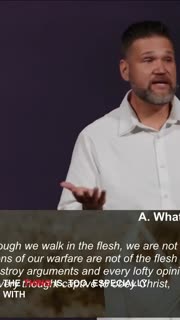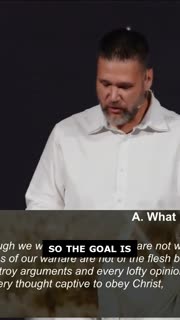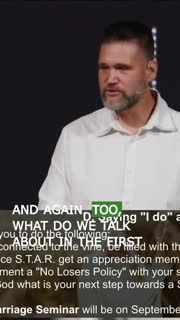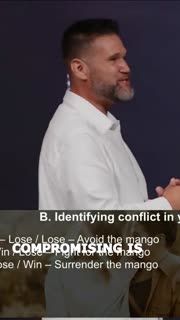Navigating Conflict: Strengthening Relationships Through Love
Devotional
Sermon Summary
Bible Study Guide
Sermon Clips
### Quotes for Outreach
1. "Conflict is everywhere where we go, right? And again marriages I think excel a little bit more in conflict than other relationships do because you are stuck with the other one and you can't just take a break from them in that but you have to work out your conflict with them and it comes down to how do we do this." [19:47] (17 seconds)
2. "The thing is, too, especially with unresolved conflict, is how do we get healing from it? And we get healing from it by abiding in Scripture. But as we're abiding in Scripture, the divine weapons that God's talking about are things like forgiveness. Forgiveness is a big weapon we can use in our relationships with one another, and it's a powerful weapon because the enemy doesn't know how to attack somebody who is a constant forgiver and loves that person regardless." [24:46] (27 seconds)
3. "So this is something we easily just kind of go over when we glance over it, but I want to encourage you, church, it's someplace we can come sit because in the end, it's not about winning the conflict, but it's how you love in the conflict. I'm going to say that again. It's not about winning in the conflict, it's about how we love in the conflict." [34:17] (18 seconds)
4. "So the goal is not to have conflict. The goal is to resolve our conflict as we work through this. So we're going to identify what conflict looks like in our lives, because for some of us, again, this looks very different. And I'm hoping if I can give you a quick map just to show you these are the different types of conflict, then we can kind of work through this together." [26:03] (20 seconds)
5. "And again, too, what do we talk about in the first and second message? The world will recognize his disciples by what? Their love for one another. So what if you have conflict in front of friends or kids? You're like, oh no, our marriage is over. No, you can demonstrate to them your love for one another. Again, where Jesus can come and say, well done in that conflict." [57:11] (25 seconds)
### Quotes for Members
1. "So the first thing we can look at here is a lose-lose, a circumventing. So circumventing means that we are both avoiding the mango. We're both just not going to touch it because we don't want conflict. And the thing is, this is probably the unhealthiest form of conflict. And I'll tell you why. If you both ignore the problem there, it becomes like a big elephant in the room, right?" [27:27] (23 seconds)
2. "So compromising is one of those words, and I'll be honest with you, many marriage books will talk about compromising as a bad thing, as something that you need to avoid because compromising is bad. And I will say it depends on compromising. And again, compromising is about 50-50, okay? And now this way I can say, we're going to cut the mango in half and we're going to share it." [31:40] (21 seconds)
3. "And the fourth one we're going to look at here is compromising. And compromising is one of those words, and I'll be honest with you, many marriage books will talk about compromising as a bad thing, as something that you need to avoid because compromising is bad. And I will say it depends on compromising. And again, compromising is about 50-50, okay? And now this way I can say, we're going to cut the mango in half and we're going to share it." [31:40] (26 seconds)
4. "And then the fourth one we're going to look at here is compromising. And compromising is one of those words, and I'll be honest with you, many marriage books will talk about compromising as a bad thing, as something that you need to avoid because compromising is bad. And I will say it depends on compromising. And again, compromising is about 50-50, okay? And now this way I can say, we're going to cut the mango in half and we're going to share it." [31:40] (27 seconds)
5. "And then the fourth one we're going to look at here is compromising. And compromising is one of those words, and I'll be honest with you, many marriage books will talk about compromising as a bad thing, as something that you need to avoid because compromising is bad. And I will say it depends on compromising. And again, compromising is about 50-50, okay? And now this way I can say, we're going to cut the mango in half and we're going to share it." [31:40] (27 seconds)
Ask a question about this sermon
1. "Conflict is everywhere where we go, right? And again marriages I think excel a little bit more in conflict than other relationships do because you are stuck with the other one and you can't just take a break from them in that but you have to work out your conflict with them and it comes down to how do we do this." [19:47] (17 seconds)
2. "The thing is, too, especially with unresolved conflict, is how do we get healing from it? And we get healing from it by abiding in Scripture. But as we're abiding in Scripture, the divine weapons that God's talking about are things like forgiveness. Forgiveness is a big weapon we can use in our relationships with one another, and it's a powerful weapon because the enemy doesn't know how to attack somebody who is a constant forgiver and loves that person regardless." [24:46] (27 seconds)
3. "So this is something we easily just kind of go over when we glance over it, but I want to encourage you, church, it's someplace we can come sit because in the end, it's not about winning the conflict, but it's how you love in the conflict. I'm going to say that again. It's not about winning in the conflict, it's about how we love in the conflict." [34:17] (18 seconds)
4. "So the goal is not to have conflict. The goal is to resolve our conflict as we work through this. So we're going to identify what conflict looks like in our lives, because for some of us, again, this looks very different. And I'm hoping if I can give you a quick map just to show you these are the different types of conflict, then we can kind of work through this together." [26:03] (20 seconds)
5. "And again, too, what do we talk about in the first and second message? The world will recognize his disciples by what? Their love for one another. So what if you have conflict in front of friends or kids? You're like, oh no, our marriage is over. No, you can demonstrate to them your love for one another. Again, where Jesus can come and say, well done in that conflict." [57:11] (25 seconds)
### Quotes for Members
1. "So the first thing we can look at here is a lose-lose, a circumventing. So circumventing means that we are both avoiding the mango. We're both just not going to touch it because we don't want conflict. And the thing is, this is probably the unhealthiest form of conflict. And I'll tell you why. If you both ignore the problem there, it becomes like a big elephant in the room, right?" [27:27] (23 seconds)
2. "So compromising is one of those words, and I'll be honest with you, many marriage books will talk about compromising as a bad thing, as something that you need to avoid because compromising is bad. And I will say it depends on compromising. And again, compromising is about 50-50, okay? And now this way I can say, we're going to cut the mango in half and we're going to share it." [31:40] (21 seconds)
3. "And the fourth one we're going to look at here is compromising. And compromising is one of those words, and I'll be honest with you, many marriage books will talk about compromising as a bad thing, as something that you need to avoid because compromising is bad. And I will say it depends on compromising. And again, compromising is about 50-50, okay? And now this way I can say, we're going to cut the mango in half and we're going to share it." [31:40] (26 seconds)
4. "And then the fourth one we're going to look at here is compromising. And compromising is one of those words, and I'll be honest with you, many marriage books will talk about compromising as a bad thing, as something that you need to avoid because compromising is bad. And I will say it depends on compromising. And again, compromising is about 50-50, okay? And now this way I can say, we're going to cut the mango in half and we're going to share it." [31:40] (27 seconds)
5. "And then the fourth one we're going to look at here is compromising. And compromising is one of those words, and I'll be honest with you, many marriage books will talk about compromising as a bad thing, as something that you need to avoid because compromising is bad. And I will say it depends on compromising. And again, compromising is about 50-50, okay? And now this way I can say, we're going to cut the mango in half and we're going to share it." [31:40] (27 seconds)










